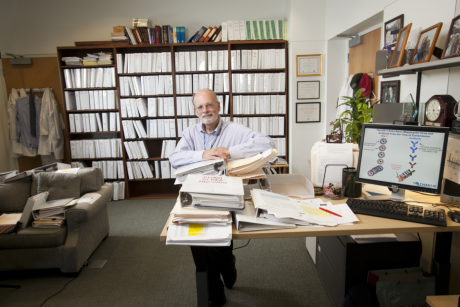
Chris Beyrer and Wendy Prudhomme O’Meara meet with longtime Duke collaborators Andrew Obala, left, and Jeremiah Laktabai, right, at Webuye County Hospital in Kenya to discuss a joint malaria research project. (Photo Credit: Castor Rotich, Freelance Photographer-Eldoret Kenya)
Published February 7, 2023, last updated on February 13, 2023 under Voices of DGHI
Duke Global Health Institute director Chris Beyrer, M.D., wrote this report following his January 2023 trip to meet with DGHI collaborators in Africa, which included stops in South Africa, Kenya, Tanzania and Rwanda. To see more photos from the trip, check out our Flickr album.
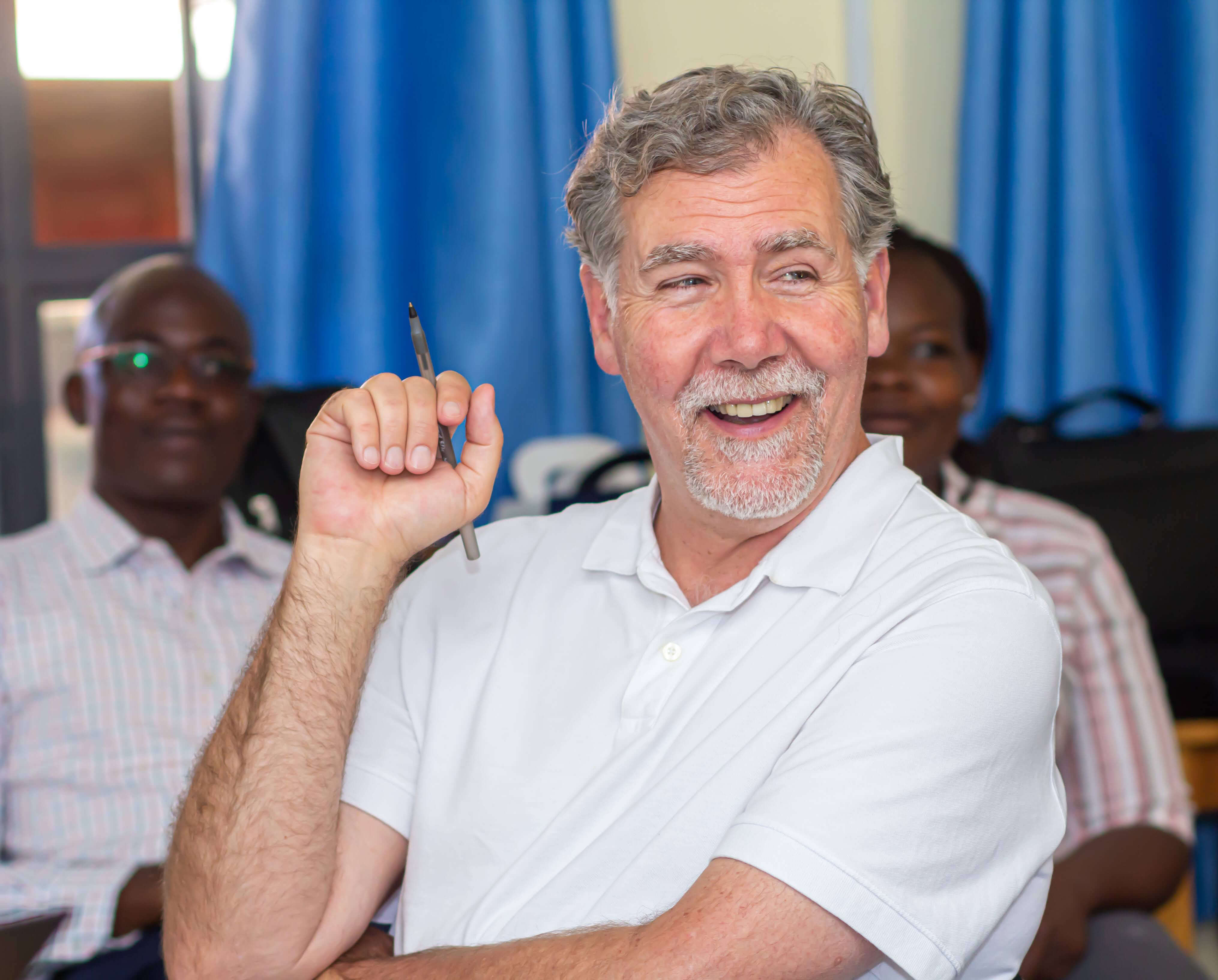
I want to share with you some of the outcomes of these visits, but first let me thank all the DGHI faculty, staff, students and fellows who organized and participated in the visits, and most particularly our extraordinary in-country partners. They make the work we all do possible, and the warmth and hospitality they showed to us was deeply touching and heartfelt.
For the Tanzania and Rwanda visits, I had the extraordinary opportunity to be joined by Duke Health System CEO and Chancellor Gene Washington. In Kenya, newly appointed DGHI Deputy Director Wendy O’Meara and newly appointed Associate Director for Research Jerry Bloomfield were both part of the host group, and Wendy also joined Gene and me on the Tanzanian leg of the journey.
Cape Town to Kenya: Broadening Collaborations
The trip began in Cape Town, South Africa, where I visited with colleagues and friends at the University of Cape Town, including Prof. Linda-Gail Bekker, Director of the Desmond Tutu Health Foundation, and Glenda Gray, Director of the Medical Research Council of South Africa. Glenda will be at Duke Feb. 13-17 for what promises to be an inspiring visit, highlighted by our event on Feb. 15 where she will give the Victor J. Dzau Distinguished Lecture in Global Health.
From South Africa (via Nairobi), the next leg was a week with our DGHI family and partners in Eldoret, Webuye and Kisumu, Kenya. I’ve been to Kenya numerous times over the decades, but never to Eldoret or to our main partner there, Moi University. DGHI’s collaborations at Moi are deep and lasting. Duke is a partner with the AMPATH Consortium, a multi-party collaboration led jointly by Indiana University, Moi University and the Kenyan Ministry of Health, and involving some 15 universities including Brown and Johns Hopkins. While AMPATH began in response to the HIV/AIDS crisis in Kenya, it is now a broader coalition, led for Duke by the Hubert-Yeargan Center, and significantly focused on improving cardiac care. The critical care facilities, where Jerry Bloomfield, Titus Ng’eno and a number of Duke faculty teach, conduct research, and provide care, are world class and have galvanized specialized critical care nursing at Moi. DGHI is working to renew our MOU with Moi and to expand the scope of this vital partnership.
Global mental health is also an important emerging area of collaboration with partners at Moi. Though Eve Puffer could not join us on the visit, her colleagues spoke highly of the value of their partnership. Addressing the huge unmet burden of mental health in the region was a theme that emerged across all our partnerships—and one we’re committed to expanding.
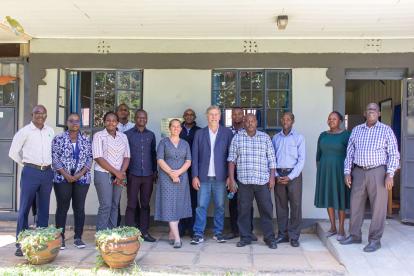
Pictured in the center are Wendy...
From Eldoret, Wendy brought us out to her malaria research site in Webuye, to the west, and to several rural villages where mosquito capture was underway. Wendy’s pathbreaking work here is a model of rigorous and innovative science conducted with families and communities eager to reduce the debilitating impacts of malaria. A visit to the very busy Webuye County Hospital underscored how much more collaborative work DGHI could engage in across the health promotion, prevention, treatment and care spectrum.
The final stop in Kenya was with Dr. Megan Huchko, Director of the Center for Global Reproductive Health at DGHI, and her colleagues in Kisumu, on Lake Victoria. Megan and her team, including a longtime friend and colleague of mine, Prof. Elizabeth Bukusi, are focused on improving screening, diagnosis, early detection and treatment of cervical cancer. They work closely with the county leadership in this effort, and at networks of public clinics serving the Kisumu community. We were later joined by the Ace Kenya team, an inspiring group working on health and rights of sexual and gender minority communities in Kenya, in collaboration with Drs. Kate Whetten and Sara LeGrand of DGHI’s Center for Health Policy & Inequalities Research.
Tanzania: Deep Roots, New Growth
After debrief meetings with the DGHI team in Kenya, I traveled next to Moshi, Tanzania, at the foot of Mt. Kilimanjaro, and the longstanding DGHI partnership at Kilimanjaro Christian Medical Centre. The wonderful Duke team of John Bartlett, Dorothy Dow, Matt Rubach and Charles Muiruri welcomed us to Moshi and to the Duke House in the doctors’ compound. A morning hike the next day with Dorothy through the coffee plantations at the foot of the mountain was both refreshing and a wonderful way to learn more about Dorothy’s important work with children and adolescents with HIV. Wendy and Gene flew in that evening, and we were joined as well by Catherine Staton and Joao Vissoci of DGHI’s newest Center, GEMINI. The days in Moshi were intense, with multiple meetings with Tanzanian leaders and partners, led by the tireless Prof. Blandina Mmbaga, Director of Research at KCMC and a key partner for all the Duke collaborators and trainees. Prof. Blandina is also the principal investigator of a Fogarty D43 award which is further advancing research capacity in Moshi.
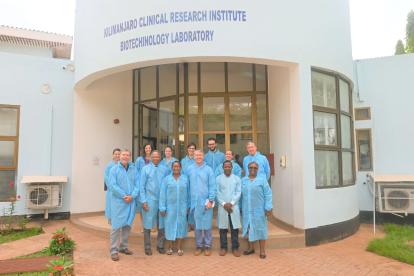
DGHI Director Chris Beyrer and...
It was remarkable to see how the partnership has strengthened the interface between clinical care and research, especially in the areas of diagnosis of acute febrile illnesses (Matt Rubach’s team), trauma and emergency care (GEMINI) and myocardial infarction. Nathan Thielman, Director of the Global Health Pathway program at HYC, was with us in Moshi as well, and he and his collaborators have a long-standing effort underway to expand HIV testing to underserved groups that started with an amazing grassroots organization right in Moshi.
On our last morning in Moshi we had a briefing from Duke School of Nursing and DGHI faculty member Brandon Knettel on his collaborative work around suicide prevention, again underscoring the importance of global mental health, as well as advanced nursing training, to the work in East Africa. Other highlights of our time in Moshi included a wonderful dinner party at Dorothy’s home and a celebration hosted by John, with his special grace and attention to detail, at the Duke House for Bishop Shoo, the head of the Lutheran Church in Tanzania and the chair of the board of KCMC.
Gene Washington, Duke Health System CEO...

Rwanda: Opportunities to Grow
The last leg of the journey was to Rwanda, with stops in Kigali and Butaro, in the far north, where the late Paul Farmer helped found the University of Global Health Equity. The night we arrived in Kigali, Gene and I had a kickoff meeting with UGHE Dean Abebe Bekele, its Vice Chancellor, the Vice Dean for students at the medical school, and the lead for partnerships at Partners in Health, which helped launch UGHE in 2015. The group was well briefed, very open to our discussions, and thrilled to have Gene visiting. Dean Bekele was especially pleased with the Global Surgery course Henry Rice has been teaching collaboratively for students at Duke and UGHE. Henry and Kate Whetten were both able to join us during our visit in Butaro. We discussed multiple areas of potential collaboration and partnership in Rwanda, including education, research, implementation science and advanced clinical training.
UGHE is really a remarkable place. It is truly Paul’s vision realized. He was involved in every aspect -- the curriculum, the hiring of an amazing team of educators, the establishment of a nearby regional hospital, and even the design of the buildings and the landscaping. It was truly inspiring. The Duke delegation was invited to plant a tree sapling for a grove Paul had planned.
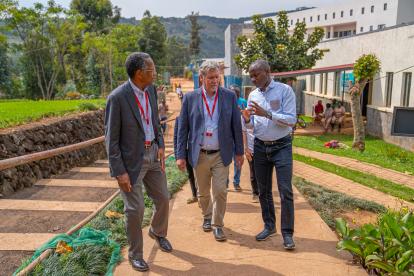
Photo Credit: Pacifique Mugemana...
With our strong partnerships in Kenya, Tanzania and Uganda, and with the emerging opportunities in Rwanda, many conversations centered on the potential for collaborations across East Africa. We also found that many of those in the region with advanced and specialty training had studied in South Africa, including at the University of Cape Town, so bringing UCT more closely into this regional consortium also makes great sense.
What an honor it was to visit with so many DGHI faculty, staff and students in our dynamic partnerships. I learned so much about the impact of our work, as well as the depth of knowledge and commitment of our partners. Traveling with Gene and watching him engage and ask questions was a lesson in focus and humanity. The future is very bright for further success in the region, and for deepening our ties in Rwanda. I am returning from this journey even more inspired by our wonderful community and truly grateful for all that we do to build lasting capacity and advance health equity.

Photo credit: Pacifique Mugemana and...

